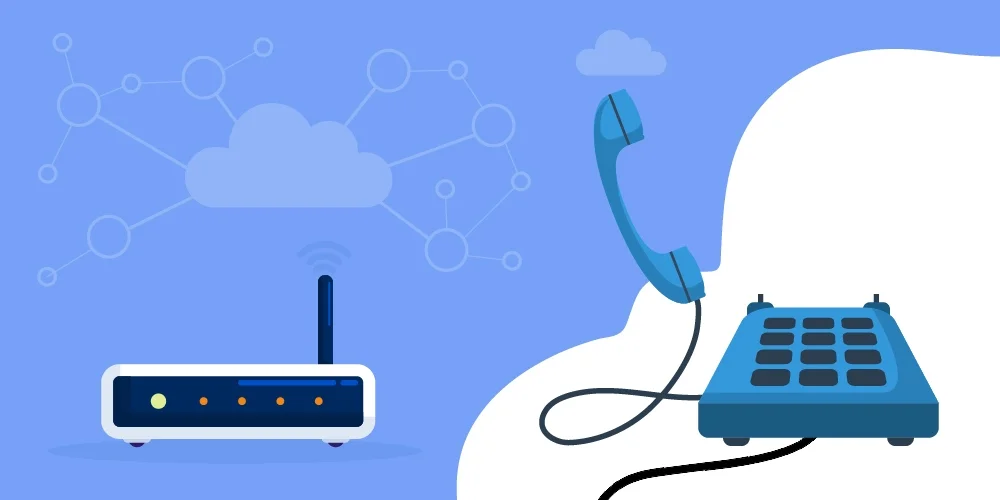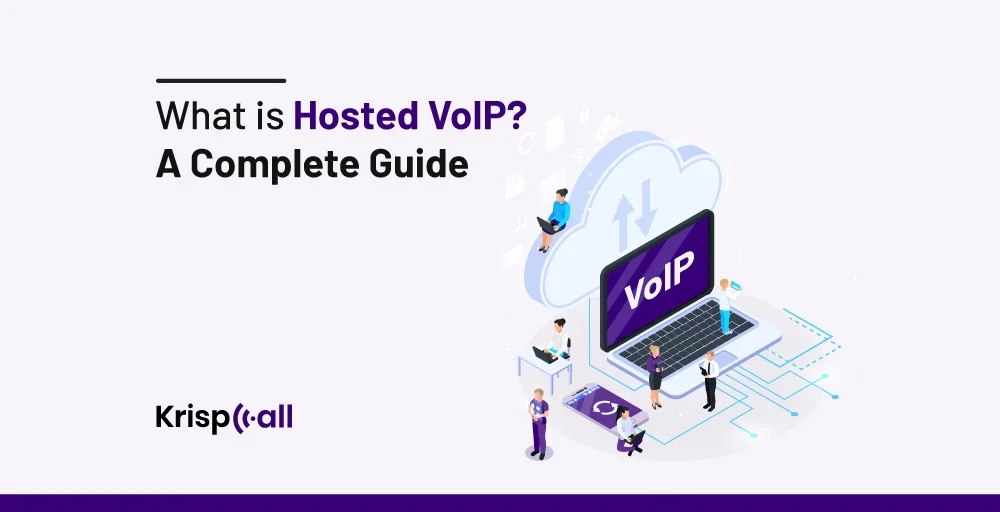Whether you’re an owner of a small startup or a large corporation, you’re probably looking for a communication solution that is scalable, versatile, and suitable for all.
If yes, you’ve got a simple answer – a hosted VoIP system.
These systems are flexible and feature-rich, like most systems out there. Regardless of whether you are looking just to upgrade your phone system or want to completely modernize it, hosted VoIP systems have all that it takes to do that.
So, what are these systems, what features & benefits do these systems come along with, how do these work, and how are they different from On-premise ones? Well, we’ll all that in this blog.
Let’s get going!
🔑 KEY HIGHLIGHTS
- A hosted VoIP service is a cloud-based phone system managed by a third party.
- A typical hosted VoIP system must provide virtual numbers and auto attendant/call routing, voicemail, call forwarding & recording features.
- Cost savings, better flexibility, mobility, security, and unified communication support are some of the benefits offered by hosted phone systems.
- The average cost of acquiring a hosted phone system ranges from $15 to $ 50 per month.
What Is Hosted VoIP?

Hosted VoIP is a type of internet-based telephony solution that is provided and managed by a third-party provider. These solutions are also known as cloud-based PBX systems and are built specifically to replace traditional phone systems.
Hosted VoIP offers several advantages over traditional phone systems. Some of these include better cost savings, flexibility to be used from anywhere, and better & advanced telephony features. And it’s particularly popular among small and medium-sized businesses looking for economical and feature-rich communication solutions.
Features Of Hosted VoIP Systems
Hosted VoIP systems, just like other cloud-based phone systems, offer a wide range of features. However, there are some essential ones that users looking to opt for these systems must watch out for. Listed below are some of those:
- Auto Attendant/Call Routing: These are the essential ones as they act as a virtual receptionist who can answer and direct calls to the appropriate department or extension. It is important to have them as they act as sophisticated call-routing options.
- Voicemail and Voicemail Transcription: These two features are some of the most important ones, especially for businesses, as they allow users to check messages when they’re unable to answer an incoming call.
- Virtual Phone Numbers: Almost every hosted telephony solution should offer virtual numbers that can be used for international calling. Virtual numbers are Internet-based, meaning you can use them from any location with an Internet connection.
- Softphone/Mobile App: A Hosted VoIP phone system should also be usable through a softphone and mobile app. Through this capability, users can access its functionalities from their mobile devices.
- Call Recording & Forwarding: These set of features are also needed as these are considered must-haves for all telephony systems. That is because with call forwarding, users can forward calls to their mobile phones, voicemails, or other telephone numbers, and with call recording, they can record every call.
How Does Hosted VoIP Work?
Hosted VoIP solutions are internet-based telephony services provided by third parties to businesses, clients, or individuals. To the basics, these are like renting a phone system from a service provider instead of buying and maintaining your own.
That said, their working process is one of the easiest to understand. For that, here’s a brief description that describes its working:
1. Conversion to Digital Data: Whenever a user makes a call using these systems, their voice is converted into digital data packets.
2. Traveling over the Internet: Next, these data packets are then sent over your Internet connection to the servers of the Hosted VoIP service provider.
3. Routing the Call: After receiving the data packets, the service provider’s servers route the call to its destination, which could be another VoIP user or a regular traditional phone number.
4. Conversion Back to Voice: Finally, once the data packets reach the destination, they are converted back into an analog signal so the other person can receive the call and hear the caller.
Note: This working detail was put forth considering how calls are made and routed. All other functionalities basically work the same.
Benefits Of Hosted Voip For Business
The real and accurate benefits of hosted VoIP systems are often difficult to pinpoint. However, to give you a sense of its advantages, here’s a rundown:
- Helps in Cost Savings: With these systems, you don’t have to acquire separate hardware, and these can reduce phone bills by 30%, which obviously means money is saved.
- Comes with Advanced Features: Almost all hosted VoIP phone systems come jampacked with many advanced features like call analytics, auto attendants, multi-level IVR, and power dialer, all of which make telephony easier.
- Offer Usage Flexibility and Mobility: End users can use these systems on any device that supports its functionality also, they can acquire virtual numbers for mobility and seamless remote communication.
- Provides Security and Simplicity: Hosted VoIP providers offer robust security features to protect your communications. And as vendors maintain all servers and hardware in their data centers, they are easy to set up and manage.
- Supports Unified Communications: These systems also have the capability to support UC, which means users can make phone calls, send SMS/MMS messages, and have video meetings from the same service.
- Comes with CRM Integrations: Lastly, hosted VoIP phone systems can also be integrated with popular CRMs and business tools. This allows businesses to streamline their communication and customer management processes.
Hosted VoIP Vs On-Premises VoIP: What is the difference?
When considering Hosted VoIP phone systems, the service provider itself manages all the necessary hardware and software on their end, essentially “hosting” your phone system in the cloud. You, the business, simply need a reliable internet connection and VoIP phones to make and receive calls.
On the flip side, an on-premises VoIP system involves installing the hardware and software for your phone system on-site at your business location. The tricky part is that you or your IT department will be responsible for configuration, ongoing maintenance, and upgrades.
An example of a hosted VoIP phone system is KrispCall. It provides almost every essential feature that a typical host should have, such as global calling, call forwarding, call transfer, IVR, and call analytics.
KrispCall’s hosted VoIP service stands out and is ideal for all businesses that need a quick transition and upgrade. Additionally, it is reasonably priced and offers a wide variety of benefits and capabilities.
Common Reasons Why Businesses Switch to Hosted VoIP Phone Systems
Even though hosted VoIP phone systems are clearly better and are bundled with loads of benefits, businesses generally don’t choose these systems just for these factors, as there are additional reasons associated with that selectivity. With that in mind, let’s discuss those elements:
- It’s Always On: With hosted VoIP, the provider you’ve chosen takes responsibility for maintaining uptime. These services are also Internet-based, meaning there is almost no downtime. In case of any issues, there’s always a robust backup system to ensure business telephony keeps flowing.
- No Hardware Requirement: With Hosted VoIP, you do not need to invest in equipment and installation upfront. That means there’s no need for bulky on-site equipment, saving businesses money and precious setup time. All you do is simply pay a monthly or annual fee and start using VoIP on your existing devices.
- Effortless Maintenance: Another good thing about hosted VoIP systems is that the provider handles everything. They’ll ensure the system runs smoothly and maintain it, freeing the IT staff to concentrate on core business activities.
- Scalability That Grows with Business: Hosted VoIP solutions are designed to grow alongside business needs. Whether it be adding or removing lines or users, it can easily be done without having to make significant changes to the infrastructure.
How Much Does Hosted VoIP Cost?
A hosted VoIP phone system can cost you anywhere from $15 to $ 50 per month. The cost typically covers the subscription fee and the features offered by the provider you choose. Additionally, the cost can also vary with incurred additional expenses for minuted calls, number types, extra features, and add-ons.
Level Up Your Calls: Upgrade to KrispCall’s Hosted VoIP System
Looking for a reliable hosted VoIP business phone system? KrispCall has you covered!
With KrispCall’s cloud phone system, all your telephony needs are met. It has features like Global Calling, which lets you make international VoIP calls, and number sharing, which lets you share a single phone number with multiple members.
You also get call analytics, which shows you every detail of every call ever made, and the Unified Callbox, which brings all telephony aspects into a single dashboard. Lastly, there are computer telephony integrations, which simply means you can easily integrate KrispCall’s VoIP system with popular business apps/CRMs. Additionally, it has the functionality to support call center telephony operations.
Why wait when you can take advantage of all these features?
Choose KrispCall’s reliable hosted VoIP solution to level up your calls!
Final Thoughts
Hosted VoIPs are revolutionary tech that offers numerous benefits for businesses of all sizes in terms of upgrading telephony. From cost savings and scalability to enhanced features and flexibility, a hosted VoIP has all that it takes to transform the way businesses communicate, especially modern ones.
The only tough part that’s involved here is choosing a reliable provider. That’s where KrispCall comes in. With KrispCall, you (a business owner) can get all the features and functionalities to upgrade your telephony, in every aspect, just by opting to use its services. And once you get a feel for it, you are bound to forget your POTS.
FAQs
Can I host my own VoIP?
Yes, you can host your own VoIP server. You can do it by setting up a Private Branch Exchange (PBX) server, which can be installed on a personal computer (PC) that you own or a dedicated PBX appliance, and then share the service through it. You also need a strong internet connection with good bandwidth for reliable service and uptime.
What are the drawbacks of VoIP?
VoIP systems have very few drawbacks, and some of those are:
- Internet dependability.
- Latency and jitter during calls.
- Vulnerability to cyber attacks.
- Occasion hidden costs.
Which is the best hosted VoIP provider?
KrispCall is the best hosted VoIP provider. That is because it has all the features and functionalities that any type of business or user would require.





